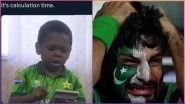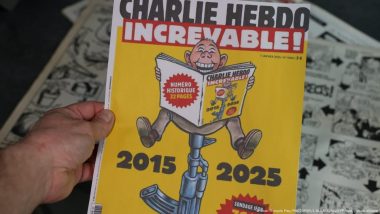French satirical magazine Charlie Hebdo is marking 10 years since the terror attacks in its Paris office by running a cartoon contest asking for God-mocking submissions.How should cartoonists satirize the Almighty? To commemorate the victims of the 2015 terrorist attack in its newsroom, French satirical magazine Charlie Hebdo held a contest titled #MockingGod, with winners announced on January 7.
Professional press caricaturists and cartoonists were called on to draw "the meanest and funniest caricature about God," with the winners published in the magazine.
Also Read | Business News | Battling Noise Induced Hearing Loss: Dr. Shree Rao Flags off Deafness Free India Campaign.
The contest marks the 10th anniversary since a massacre in the magazine's editorial offices on January 7, 2015. Twelve people, including 8 members of the Charlie Hebdo editorial team, were murdered by Islamist extremists.
The satirical magazine was targeted because it had repeatedly mocked the Prophet Muhammad. Among those who lost their lives were some of France's most famous cartoonists, including Cabu, Charb and Wolinski.
Freedom of the press under attack
The Charlie Hebdo murders were seen as an attack on freedom of the press, and freedom of speech in general.
The slogan "Je suis Charlie" (I am Charlie) trended around the world. But it also sparked a backlash from some who felt the publication routinely went too far.
A decade after the attack, some observers say the need for cartoonists and their ability to generate laughter — even if controversial — is greater than ever due to repression of freedom of speech globally.
"We are monitoring the situation of international cartoonists wherever they are on the planet, and I must say the trend is really bad," said cartoonist Patrick Lamassoure, known by the pen name Kak.
"China, Russia, Iran, India, Indonesia, Malaysia and Brazil, among others, the majority of the world's population lives in countries where there is press censorship [and] cartoonists are often attacked and threatened."
Lamassoure is the president of Cartooning for Peace, an international network of press cartoonists "who use humor to fight for respect for cultures and freedoms."
Charlie Hebdo's 2025 contest called on submissions from "everyone who is fed up with living in a society directed by God and religion," said the contest website.
While the results could cause further controversy, Lamassoure, whose organization is hosting a number of events dedicated to Charlie Hebdo in January, is in full support.
"I think it's great because it's something that Charlie Hebdo would have done, even if nobody had attacked them," he told DW.
France's long history of political cartooning
In France, political cartoons gained popularity after the French revolution, when cartoonists were exposing abuses of power.
The tradition of anti-religious cartoons has since stayed strong in France.
"Cartooning represents the ability of citizens to look our leaders in the eye and say 'we see what you're doing and we can laugh at you'," said Lamassoure.
Since it was founded in 1970, Charlie Hebdo has been known for testing the boundaries of what can and can't be said according to French hate speech laws.
The magazine not only makes fun of Islam, but also of Christianity and Judaism.
According to French law, as long as violence is not incited and minorities are protected, mockery of religion is permitted.
How far is too far?
Even if cartoons upset some people, Lamassoure argues that only the law can decide what is acceptable.
"Because anything I say and do will piss someone off — anything. And the only limit can be the law because the law we all agree on," he said.
But even before 2015, the magazine gained notoriety for cartoons that critics said crossed the line into bigotry — and was subject to attacks.
Shortly after Charlie Hebdo released a spoof edition "guest-edited" by the Prophet Mohammad, a firebomb damaged the building housing the magazine in 2011.
But that kind of provocative commentary is all in a day's work for political cartoonists.
"And if people are angry because they don't like what you say, that's good, that's freedom of expression — as long as you don't break any law," said Lamassoure.
A responsibility to poke fun at those in power
But there are still people willing to break the law in order to express their objection to Charlie Hebdo's legally-protected artistic expression.
This means that the magazine's Paris staff must do their work in secret premises that are strictly guarded. Some employees also remain under police protection.
According to Cartooning for Peace, France is one of the last bastions keeping satire alive. No topic — including religion — is off limits.
"There are not that many countries left where you can actually laugh about whatever you want to and not be threatened for it," says Lamassoure.
He feels a "responsibility to keep that flame going" because the ability to laugh at people in power is a "fundamental need of societies [and] very important freedom."
"Even people who criticize cartoonists need that freedom," he added.
Edited by Tanya Ott
(The above story first appeared on LatestLY on Jan 07, 2025 01:10 PM IST. For more news and updates on politics, world, sports, entertainment and lifestyle, log on to our website latestly.com).













 Quickly
Quickly


